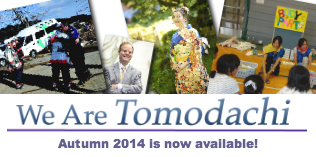[Japan International Cooperation Agency] [Tuesday, Dec 16, 2014]
Contributing to Containing Ebola in Senegal
Ebola went on the rampage in West Africa. Although an infected patient was confirmed in Senegal at the end of August, thanks to adequate response by the Government of Senegal, the country declared an “all clear” in mid-October.
Using information and human networks gained in past cooperation, JICA has greatly contributed to containing Ebola in Senegal by swiftly implementing emergency assistance and mid- to long-term assistance.
'All Clear' announced after confirmation of only one case
It was reported Aug. 29 about the first case in Senegal that a student of Guinean nationality was infected by the Ebola virus, and he was quarantined in a special ward of a national hospital in Dakar, Fann Hospital. After being treated by trained staff specializing in infectious diseases, he recovered and made it home to Guinea on Sept. 20.
Quarantine and monitoring of 74 people who had contact with this patient were also completed on Sept. 18. Since then, no Ebola case has been found in Senegal and the Ministry of Health and Social Action has declared the outbreak over.
Considering the fact that cases of secondary infections were found in the U.S. and Spain, which are believed to have advanced medical care systems, Senegal’s case can be considered remarkable.
Emergency assistance swiftly implemented
“Japan always stays beside us,” said Minister for Health Awa Marie Coll-Seck at a hand-over ceremony of emergency supplies from Japan, which took place two weeks after an announcement of the Ebola case.
Aiming for urgent assistance first, JICA’s Expert Toshiyasu Shimizu, who was assigned as a technical advisor for the minister for Health and Social Action, immediately had a discussion with people involved in the ministry by using his network gained through past cooperation, and prepared a list of required supplies. Based on the list, the ministry announced required supplies to the international community, including the Japanese government.
In response, JICA provided supplies including medical equipment and goods, beds and consumable goods to Fann Hospital to strengthen its facilities for the patients and to build up a system to quarantine and treat Ebola patients and suspected patients.
Also, using the human network of the ongoing Project for Reinforcement for Maternal and New Born Health Care Phase 2 and other means, JICA provided health and hygiene equipment including antiseptic solution and aerosol, as well as work clothes, to enhance measures for preventing infection. The equipment was sent to health centers in five regions that share a border with Guinea where Ebola infection is serious. They are Tambacounda, Kedougou, Kolda, Fatick and Dakar.
Regional health Officers in the recipient regions gave feedback including that the preventive structure of the facility was strengthened, and awareness of prevention among the staff and patients was improved.
Once the habit of washing hands using antiseptic solution is established, it is effective not only for preventing Ebola virus infection but also other infectious diseases such as cholera.
Strengthening awareness activities from a mid- to long-term perspective
In addition to the emergency assistance to the Ministry of Health and Social Action, JICA is conducting a major awareness campaign for prevention from a mid- to long-term perspective, in cooperation with the Ministry of Fisheries and Maritime Economy and the Ministry of Education.
Jointly with the Ministry of Fisheries and Maritime Economy, JICA provided assistance to an awareness campaign for small-scale fishermen, their families, and friends who might have contact with them (approximately 400,000 people). The campaign distributed awareness posters, T-shirts, and antiseptic solution to the small-scale fishermen who returned home from neighboring countries such as Guinea and Liberia in time for Tabaski (1) on Oct. 5. Regional offices of the Ministry of Fisheries and Maritime Economy and small-scale fishermen’s associations helped with the distribution of campaign goods.
Fishermen who received the goods said, “A poster has been put up within our sight so we now wash our hands more frequently,” “We load antiseptic sets (buckets and antiseptic solution) on our boat so we can use them at any time” and “awareness of Ebola prevention has increased.”
Also, with the Ministry of Education, JICA is in discussions to promote the awareness campaign to teachers and students through elementary schools. It will involve the Strengthening Mathematics, Science, and Technology Education Project Phase 2. While the project plans to provide training in science and mathematics education targeted to all primary school principals in the six regions (approximately 3,000 people), it was decided to add Ebola prevention training to it.
To implement the training, JICA worked together with the United Nations Children's Fund (UNICEF), which supports drafting materials for teacher training, and held a workshop to create the training material in late October.
JICA swiftly implemented assistance with Ebola countermeasures and contributed to containing the spread of infection. In the future, it also plans to proactively work on the provision of required equipment, as well as awareness campaigns in the neighboring countries of Mali and Guinea, where the situation is more serious.
Note:
1: Tabaski is also known as Eid al-Adha or the “sheep festival.” It is the biggest annual event for Muslims.
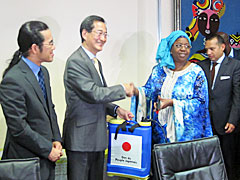 Ambassador of Japan Takashi Kitahara, second from left, hands over hygiene equipment to Senegal’s Minister for Health Awa Marie Coll-Seck.
Ambassador of Japan Takashi Kitahara, second from left, hands over hygiene equipment to Senegal’s Minister for Health Awa Marie Coll-Seck. 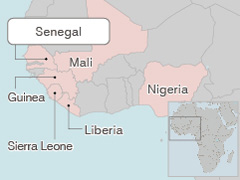 The map shows the countries with Ebola cases in West Africa. The cases in Senegal and Nigeria have been contained (as of Nov. 21, according to the World Health Organization).
The map shows the countries with Ebola cases in West Africa. The cases in Senegal and Nigeria have been contained (as of Nov. 21, according to the World Health Organization). 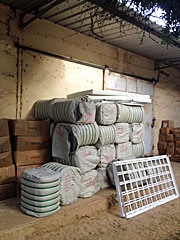 Some of the supplies provided to Fann Hospital, including beds and blankets.
Some of the supplies provided to Fann Hospital, including beds and blankets. 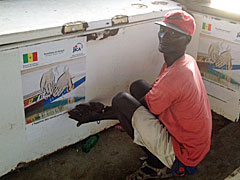 A fisherman talks about the importance of washing hands in front of a poster.
A fisherman talks about the importance of washing hands in front of a poster.
[Japan International Cooperation Agency] [Thursday, Dec 18, 2014]
JICA Helps Vietnam Prepare for the Possibility of Ebola Cases
In response to the recent Ebola epidemic in West Africa and cases emerging elsewhere, the Vietnamese Government has, with JICA's help, taken steps to prepare for the possibility of Ebola gradually making its way to Vietnam.
Japan sent an infectious disease specialist to Vietnam Oct. 4 to 14 to hold a workshop for Vietnamese researchers and medical professionals on laboratory detection methods and the safe handling of possible Ebola specimens. Shuetsu Fukushi, a virus research official at Japan's National Institute of Infectious Diseases (NIID), also provided guidance and advice on efforts to establish a system for testing for the virus.
The work was done in coordination with JICA's ongoing “Project for Capacity Development for Laboratory Network in Vietnam of Biosafety and Examination of Highly Hazardous Infectious Pathogen.”
Fukushi gave basic lectures on topics including basic scientific knowledge of Ebola, its epidemiology so far, how to actually inactivate the Ebola virus in suspected specimens in a laboratory, and an outline of general laboratory detection methods. Then he provided hands-on training in deactivating suspected Ebola specimens in a laboratory of Vietnam's National Institute of Hygiene and Epidemiology (NIHE).
In the training, Fukushi emphasized that the proper use of personal protective equipment and biosafety cabinets when handling suspected Ebola specimens is essential to preventing infection. He also stressed strictly observing biosafety principles learned in project training so far.
In training on detecting virus genes and antibodies, participants succeeded in detecting the Ebola virus and it was confirmed that they learned basic laboratory detection methods.
Before Fukushi was dispatched, Vietnam's Ministry of Health made an emergency assistance request to the “Project for Capacity Development for Laboratory Network in Vietnam of Biosafety and Examination of Highly Hazardous Infectious Pathogen” through the NIHE and the World Health Organization's Vietnam office. The request was to invite specialists from NIID for help creating a structure for laboratory detection of the Ebola virus.
The project responded rapidly in collaboration with the JICA headquarters and the relevant research department and international cooperation office at NIID.
As of December 3, the World Health Organization had confirmed 17,145 people had contracted Ebola and 6,070 had died from it in the latest outbreak.
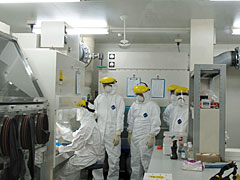 Hands-on training in deactivating suspected Ebola specimens in a laboratory of Vietnam's National Institute of Hygiene and Epidemiology
Hands-on training in deactivating suspected Ebola specimens in a laboratory of Vietnam's National Institute of Hygiene and Epidemiology
[Ministry of Foreign Affairs] [Tuesday, Dec 16, 2014]
Exchange of Diplomatic Notes concerning Entry into Force of the Agreement between Japan and Australia for an Economic Partnership
1. Following the cabinet decision on December 16, the exchange of diplomatic notes concerning entry into force of the Agreement between Japan and Australia for an Economic Partnership, will take place in Canberra, Australia, today between Mr. Yoshitaka Akimoto, Japanese Ambassador to Australia, and Ms. Jan Adams, Deputy Secretary, Department of Foreign Affairs and Trade of Australia. With this exchange of notes, this Agreement will enter into force on January 15, 2015.
2. This Agreement will promote liberalization and facilitation of trade in goods and services and increase investment opportunities between Japan and Australia, thereby enhancing bilateral partnership regarding economic activities. It will also strengthen cooperation in various areas such as food supply, energy and mineral resources, movement of natural persons, competition and consumer protection, intellectual property and government procurement.
3. It is expected that entry into force of this Agreement will greatly invigorate both economies and further strengthen the relationship between the two countries.
(Reference 1)
Article 20.4 of this Agreement stipulates that this Agreement shall enter into force on the thirtieth day after the date on which the Governments of the Parties exchange diplomatic notes informing each other that their respective legal procedures necessary for entry into force of this Agreement have been completed.
(Reference 2)
This Agreement is the 14th EPA for Japan, following EPAs which already entered into force with Singapore, Mexico, Malaysia, Chile, Thailand, Indonesia, Brunei, ASEAN, Philippines, Switzerland, Viet Nam, India and Peru.
[The Government of Japan] [Monday, Dec 15, 2014]
'We Are Tomodachi Autumn 2014' are now available in Spanish and French!
The latest issue of "We Are Tomodachi", Japanese Gov’t official magazine, is now available also in Spanish and French. Learn about Japanese high technology such as the Shinkansen, enjoy beautiful autumn photos in Japan, and more!
